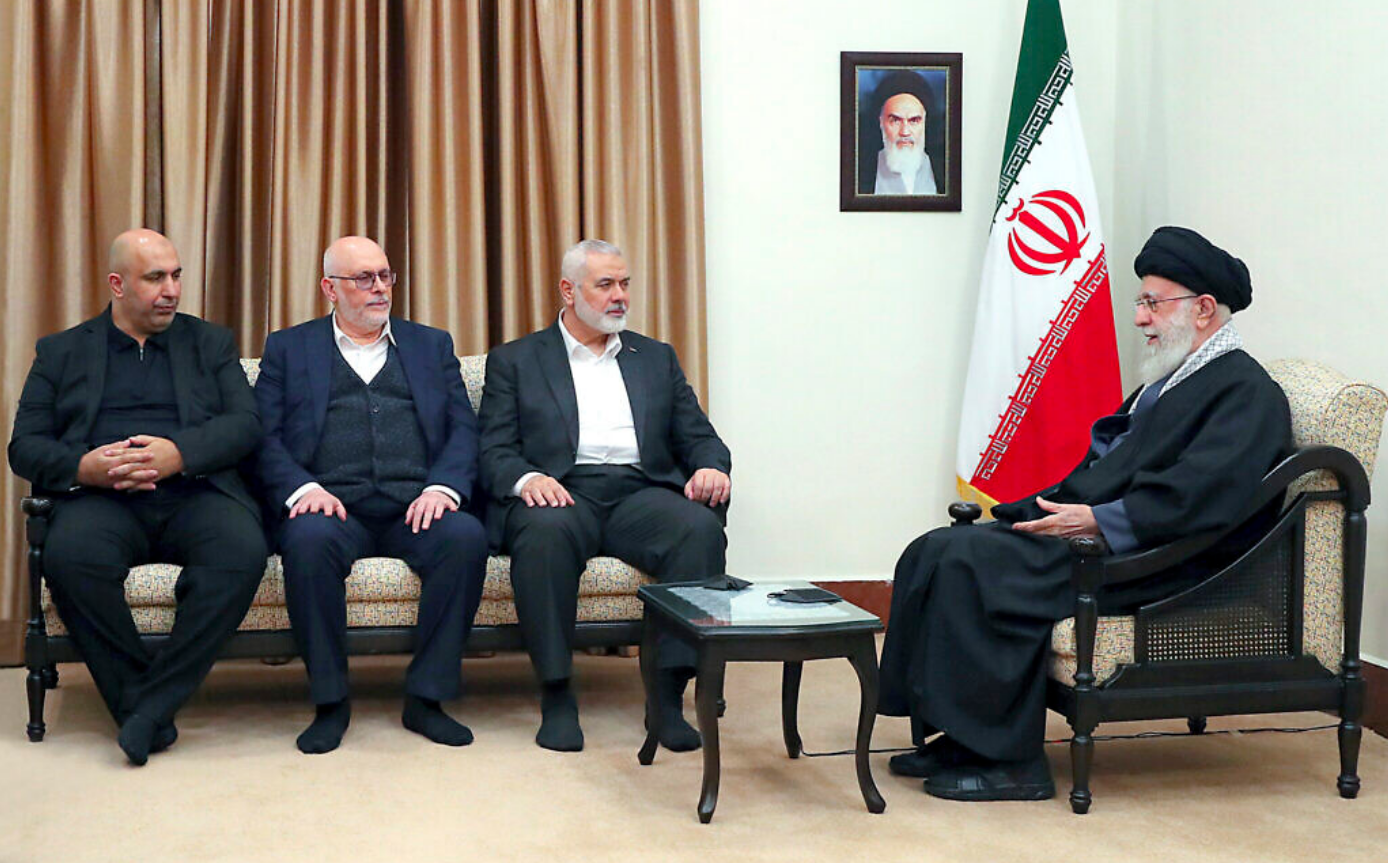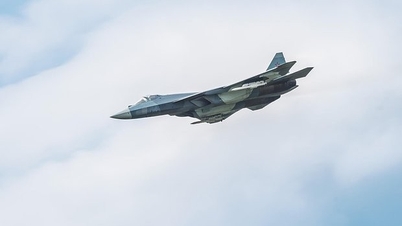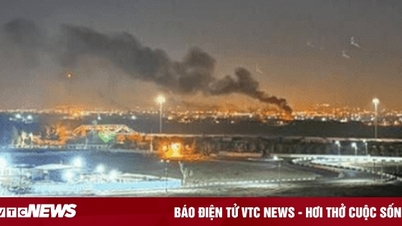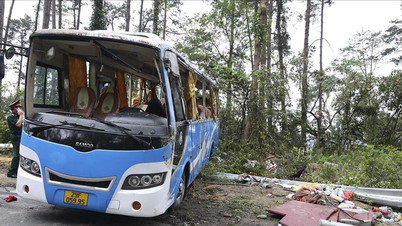Explosions and air raid sirens rang out across Israel late on April 13 (local time) after Iran launched hundreds of drones, ballistic missiles and cruise missiles toward the Jewish state, raising the risk of the conflict escalating into the wider Middle East.
Israel said Iran fired more than 300 UAVs and missiles, but 99% of them were intercepted.
Calling the result “a very important strategic success,” Rear Admiral Daniel Hagari, spokesman for the Israel Defense Forces (IDF), said Iran fired 170 drones, more than 30 cruise missiles and more than 120 ballistic missiles. Some of these ballistic missiles reached Israeli territory, causing minor damage to an air base.
In Washington DC, US President Joe Biden said US forces had helped Israel down “nearly all” of the flying objects, and pledged to convene allies to come up with a unified response.
Tehran's attack, less than two weeks after an alleged Israeli strike in Syria that killed two Iranian generals, marked the first time Iran has launched a direct military attack on Israel since 1979.
Risk of escalation
Many sides were quick to speak out. United Nations (UN) Secretary-General Antonio Guterres strongly condemned the serious escalation caused by Iran's large-scale attack on Israel, warning that neither the region nor the world can afford another war.
The UN chief called on all parties to exercise maximum restraint to avoid any action that could lead to a major military confrontation on multiple fronts in the Middle East.
The UN Security Council (UNSC) will meet on the afternoon of April 14 to discuss the situation. France said Iran was “at risk of a military escalation,” Britain called the attack “reckless,” and Germany said Iran and its proxies “must be stopped immediately.”
The Middle East is once again facing the prospect of a wider war as Israeli Prime Minister Benjamin Netanyahu's War Cabinet meets on the morning of April 14 to decide Israel's response to Iran's attack.

Israel's war cabinet chaired by Prime Minister Benjamin Netanyahu. Photo: Getty Images
Earlier, IDF spokesman Hagari said most of the interceptions took place outside Israel's borders, including 10 cruise missiles that were intercepted by fighter jets.
“A large-scale Iranian attack is a major escalation,” Hagari said. Asked if Israel would respond, the spokesman said only that the military “is doing and will do whatever is required to protect the security of the state of Israel.” He said the incident was not over and dozens of Israeli warplanes remained in the air.
The Israeli military says its Arrow system is capable of shooting down ballistic missiles outside the atmosphere, handling most interceptions, and notes that “strategic partners” are involved.
“At my direction, in support of Israel’s defense, the United States military has deployed ballistic missile defense aircraft and destroyers to the region over the past week,” President Biden said in a statement. “Thanks to these deployments and the extraordinary skill of our service members, we have helped Israel take down nearly every incoming drone and missile.”

US President Joe Biden meets with his national security advisers at the White House. Photo: Times of Israel
US Defense Secretary Lloyd Austin said in a separate statement that US forces “intercepted dozens of missiles and drones headed toward Israel, launched from Iran, Iraq, Syria and Yemen.”
Biden and Netanyahu spoke for 25 minutes on the phone early on April 14 (Israel time). Biden said in his statement that he reaffirmed America’s “ironclad commitment” to Israel’s security.
According to some Israeli media, the US President also called for restraint.
Retaliation
Iran has vowed to retaliate for the April 1 airstrike on its consulate in Damascus, Syria, which Tehran blames on Israel. Israel has not commented on the incident.
In a statement released by Iran's state news agency IRNA late on April 13, the country's paramilitary Islamic Revolutionary Guard Corps (IRGC) admitted to launching dozens of UAVs and missiles toward Israel.
In a later statement, the IRGC issued a direct warning to the US that any support or involvement in harming Iran's interests would result in a decisive response by the Iranian armed forces.
IRNA also quoted an unnamed official as saying that ballistic missiles were part of the attack. A ballistic missile travels in a dome-shaped trajectory, rising into space before gravity brings it crashing down at speeds many times faster than the speed of sound.
Israel has a multi-layered air defense network that includes systems capable of intercepting a variety of threats including long-range missiles, cruise missiles, UAVs, and short-range missiles. However, in a large-scale attack involving multiple UAVs and missiles, the likelihood of success is higher.
Iran has a huge arsenal of drones and missiles. Online videos shared by Iranian state television show delta-wing UAVs similar to the Iranian Shahed-136s seen in Ukraine.

Iran's Supreme Leader Ayatollah Ali Khamenei (right) speaks during a meeting with Hamas leader Ismail Haniyeh (second right) in Tehran, March 26, 2024. Photo: Times of Israel
Some Israelis witnessed the interception, which lit up the night sky. Air raid sirens were reported in several places including northern Israel, southern Israel, the northern West Bank and the Dead Sea near the Jordanian border.
The Israeli military has ordered residents of the Golan Heights – near the Syrian and Lebanese borders – as well as the southern towns of Nevatim and Dimona and the Red Sea resort of Eilat into protected areas. Dimona is home to Israel’s main nuclear facility and Nevatim has a major air base. Loud explosions were heard in Jerusalem, northern and southern Israel…
Precautions
Several countries across the Middle East closed their airspace and rerouted flights on April 13 following Iran's massive attack on Israel.
Lebanon's Transport Minister Ali Hamieh said on Twitter that his country's airspace will be temporarily closed to all flights from 1 a.m. to 7 a.m. local time as a precautionary measure.
During that time, Rafik Hariri International Airport, the country's only airport, will be closed and updates will be provided based on developments, Hamieh said.
Egypt has also closed its airspace amid the ongoing Israeli-Iranian military escalation. Kuwaiti authorities announced that all flights to Kuwait have been diverted away from areas of tension between Israel and Iran to ensure the safety of passengers, according to the state news agency KUNA.
Jordan has declared a state of emergency, according to state-owned Al-Mamlaka TV. The Middle Eastern country has also closed its airspace to flights due to the current escalation.
Iraq also announced the closure of its airspace and the suspension of all civilian flights .
Minh Duc (According to AP, Anadolu, The Guardian)
Source


![[Photo] National Assembly Chairman Tran Thanh Man attends the Party Congress of the Committee for Culture and Social Affairs](https://vphoto.vietnam.vn/thumb/1200x675/vietnam/resource/IMAGE/2025/5/11/f5ed02beb9404bca998a08b34ef255a6)
![[Photo] National Assembly Chairman works with leaders of Can Tho city, Hau Giang and Soc Trang provinces](https://vphoto.vietnam.vn/thumb/1200x675/vietnam/resource/IMAGE/2025/5/11/c40b0aead4bd43c8ba1f48d2de40720e)



![[Photo] Discover the beautiful scenery of Wulingyuan in Zhangjiajie, China](https://vphoto.vietnam.vn/thumb/1200x675/vietnam/resource/IMAGE/2025/5/11/1207318fb0b0467fb0f5ea4869da5517)

























![[Photo] Prime Minister Pham Minh Chinh chairs the fourth meeting of the Steering Committee for Eliminating Temporary and Dilapidated Houses](https://vphoto.vietnam.vn/thumb/1200x675/vietnam/resource/IMAGE/2025/5/11/e64c18fd03984747ba213053c9bf5c5a)


































































Comment (0)